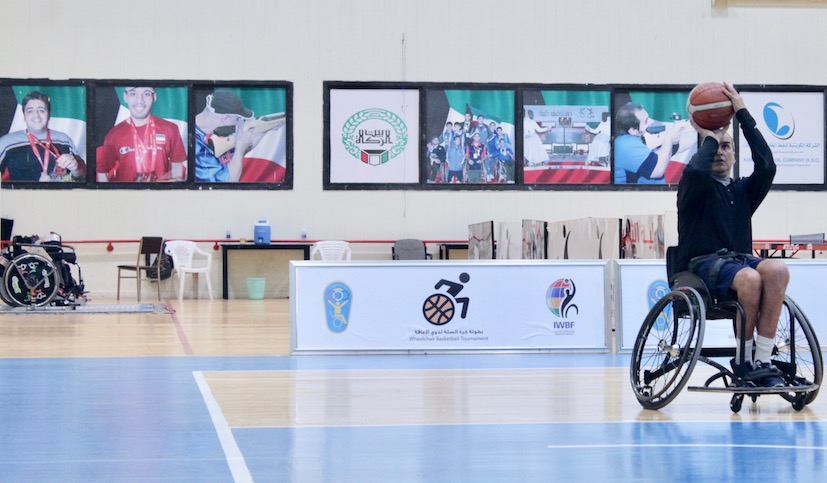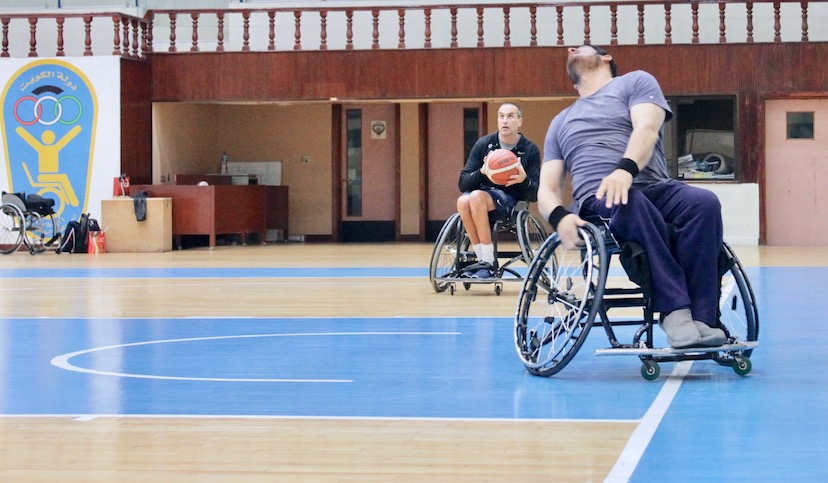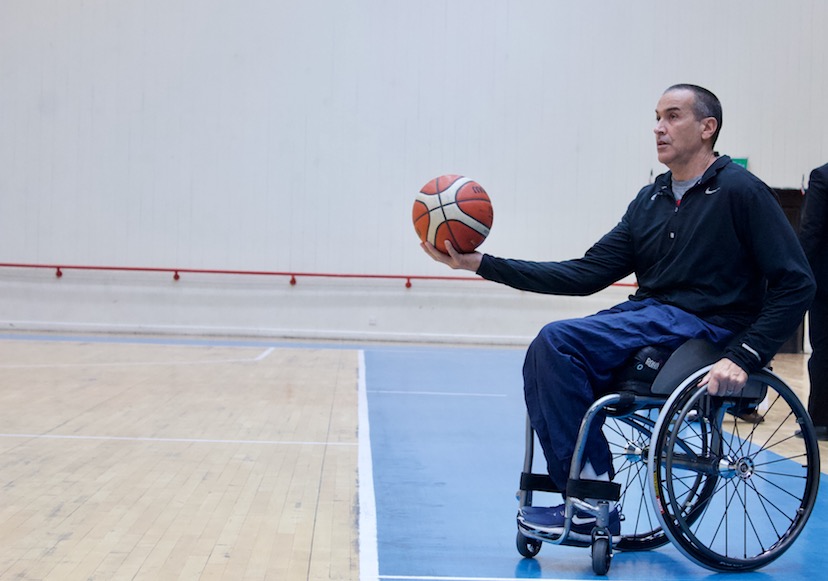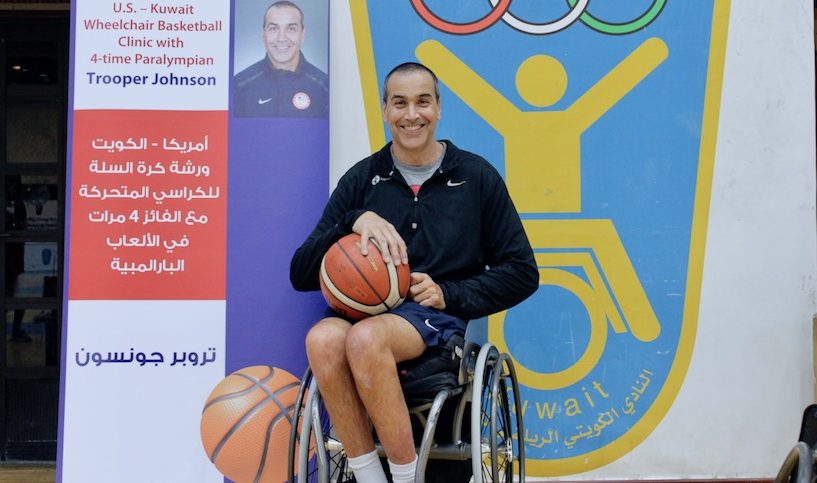Trooper Johnson is a four-time Paralympian, an inductee of the National Wheelchair Basketball Association Hall of Fame and the man who is responsible for taking the women’s wheelchair basketball team to the 2020 Olympics. That is just the tip of the iceberg. The man’s career is unbelievable, and has achieved things most of us can only dream of.
He is also a U.S. Sports Envoy and spent a week in Kuwait. The program, developed by US embassies and consulates around the world, takes elite athletes and coaches overseas to participate in community outreach activities. They organize sports clinics for young people and their coaches. It is not just about teaching the technical skills of a game, but there is also a lot of focus on diversity, dialogue, leadership and respect of diversity.
The clinics were held at the Kuwait Disabled Sports Club. But Trooper didn’t just talk about best practices and techniques in wheelchair basketball, he also discussed positive coaching, raising awareness for the needs of the community, parenting a child with mobility issues and how to get through the tougher situations in life.
Trooper is humble, warm and down-to-earth. But you can still sense the competitiveness, drive and a can-do will-do attitude.
The huge grin on his face was only made wider when someone passed him a basketball. Laughing, he said “I feel more comfortable holding a basketball”. He half hugged it, half leaned on it as if it were a cushion. The thing I was most curious about was if he had planned his career. Everyone wants to know how to get to the top of their field, and stay there.
Surprisingly, he didn’t. He said “I hope I make the next step and then you just build from there and you look back and you say ‘wow I have had a good career’.” It is ironic because growing up he loved football, played a little bit of hockey and some tennis.
An accident in his late teens left him in a wheelchair. According to Trooper, the thing that helps people get through a late-onset disability is returning to their previous lifestyle. For him, it was being physically active.
This was in the early 80s and his options were limited. There were only three options for people in wheelchairs, racing, tennis and basketball. He wasn’t fond of wheelchair tennis, or interested in racing, but he did enjoy team sports. He got tricked into going to a basketball gym. A year of surgeries after the accident had left him feeling lost. Trooper’s therapist told him that they were going to grab a sandwich and he found himself at the University of New Mexico watching other team members shoot hoops from their wheelchairs. He had a sudden sense of belonging, and it felt like home.

Source: bazaar
I understand this, as I watched him shoot hoops on his own. The energy is different. Trooper becomes focused, quick and energized. When he is joined by three other players and they start playing a friendly game, the energy changes again. They were having fun, laughing and engaged, but still competitive. They deftly dance around their competitors in their large wheelchairs, and they get so close, yet never touch or bump one another.
A team can become a second family, a support system that helps all its members. Everyone has a story, some of them are funny and some are very tragic. But thankfully, it’s not all bad. Being able to look back and say it wasn’t as bad as we thought and that it was kind of funny moves everyone forward. The team gets to laugh at their situation. That is how they worked through it. They would say that happened to me, and someone else would say oh I can top that!

Source: bazaar
Trooper’s new life had gotten back to normal when he was with his teammates and realized that “this is life, everything is the way it used to be, the only difference is being in the chair.”
Trooper’s unique perspective as coach helps him see things differently too. Athletes that have become disabled still possess spatial and court awareness, they just need to learn how to adapt their abilities to their wheelchair. Players that were born with a disability and or had an onset at an early age and have grown up knowing their wheelchair, and understand that component really well. They need to work on their presence on the court instead. There is an advantage to both situations and these nuances just add to the game and definitely life.
Trooper is a member of the Advisory Board for Positive Coaching Alliance. Passionate about youth sports, he believes that we need to redefine the meaning of winning. In a tournament of sixty- eight teams, there just can’t be one winner. The alliance wants to make sure that kids are learning independence, social integration, respect, discipline, structure and everything that sports have to offer. He represents the disabled community on the board and thinks that kids with disabilities need this even more than their able-bodied counterparts. It gives them a voice and empowers them to represent themselves. The benefits of sports apply to everyone.
Part of their job is to make sure that players learn to manage their own effort. Coaching is about leading not just teaching technical skills. Regardless of winning or losing, players need to be able to measure their performance, define small goals, and then stay accountable. This redefines winning, as it is about improvement, applying concepts, maintaining focus and supporting the team. Values which translate into real life and creating not just better players, but also better humans in life.
And Trooper does live by these ideals. When I asked him about his Paralympic medals, he told me how his wife had found one in the garage. For him, that moment on the podium is the shortest part of the journey. It takes a lot of time, energy and people to get to there and it is where the real value lies.

Source: bazaar
When I asked him what he thought his greatest achievement was, I was expecting something to do with basketball. Instead he surprised me by saying it was surviving his children. He is the father to a boy and triplets, only eighteen months apart. They love teasing him and would move his chair away whenever he got off it. Then they would sit on top of him while he had to crawl across the room to get it. Trooper’s genuine laughter about it tells you a lot about him.
What is next for Trooper? He loves coaching the national team, but he loves giving back to the community that gave him this life. Participating in the US Sports Envoy program and visiting communities all over the world is his way of doing that. Highlighting the possibilities that sports can offer the disabled communities is his way of making sure that others can access the opportunities that changed his life.
For more information on the US Sports Envoy Program check their website eca.state.gov.
Follow the US Embassy in Kuwait for updates and information on any upcoming outreach programs @ usembassyq8 on Instagram. You can nd the Kuwait Disabled Sports Club and their news @kdsc2016 on Instagram.








